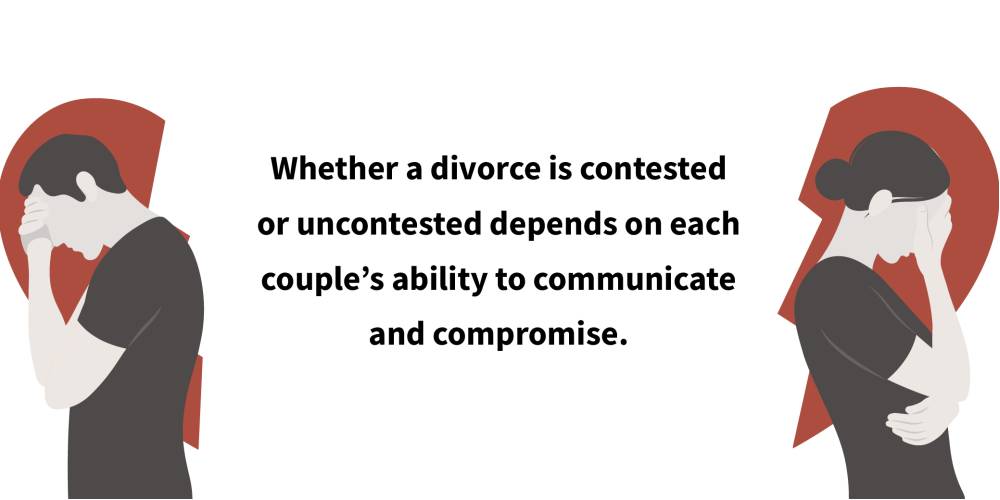Three Differences Between a Contested and Uncontested Divorce in Illinois
 Understanding the type of divorce you are facing can help you prepare for what lies ahead. Broadly speaking, divorces in Illinois fall into two categories: contested and uncontested. These terms describe whether you and your spouse are in agreement about major issues such as property division, child-related matters, and support. Knowing the difference is not just a matter of legal terminology; the type of divorce you file for will determine the time, cost, and often the emotional toll of the process.
Understanding the type of divorce you are facing can help you prepare for what lies ahead. Broadly speaking, divorces in Illinois fall into two categories: contested and uncontested. These terms describe whether you and your spouse are in agreement about major issues such as property division, child-related matters, and support. Knowing the difference is not just a matter of legal terminology; the type of divorce you file for will determine the time, cost, and often the emotional toll of the process.
As of September 2025, Illinois divorce law continues to allow couples to dissolve their marriages either through an uncontested settlement or through contested litigation. The Illinois Marriage and Dissolution of Marriage Act (750 ILCS 5) governs both types of proceedings. Our Arlington Heights divorce attorney can review your situation to help you decide which type of divorce will best suit your case.
Difference #1: Agreement on Major Issues
The single most important factor separating contested and uncontested divorce is whether both spouses can agree on how to manage the core issues.
In an uncontested divorce, spouses agree on every major aspect of the separation. This includes property and debt division, parenting time and parental responsibilities, child support, and spousal maintenance. Because the parties have already worked out their differences, the process is streamlined and typically avoids lengthy litigation. Couples often use mediation or collaborative law to reach these agreements outside of Court, and a Judge only needs to approve the final settlement.
In contrast, a contested divorce is when spouses cannot agree on one or more of these critical points. Disputes may involve something as specific as who keeps the family home or as broad as how parental responsibilities will be divided. When disagreements are not resolved using mediation or negotiation, the case must go before a Judge. The Judge has the authority to decide each disputed matter under the standards set out in Illinois law. For example, when determining parenting arrangements, the Court is guided by the "best interests of the child" standard under 750 ILCS 5/602.5.
Because contested divorces require judicial intervention, they are more formal, adversarial, and time-consuming. Couples who cannot compromise cede control of life-changing decisions to the Court.
Difference #2: Time and Cost
Time and cost also differ between contested and uncontested divorce. Uncontested divorces generally move faster. In Illinois, once all agreements are finalized and filed, the uncontested divorce process can take as little as only a few months. Since fewer hearings are needed, attorney fees are lower, and couples avoid many of the costs associated with litigation. Couples who are able to work together may find that an uncontested divorce allows them to move forward with their lives quicker and with less financial strain.
Contested divorces are another story. When spouses cannot resolve disputes, each issue requires motions, hearings, discovery, and sometimes even a full trial. This can extend the divorce timeline to a year or more, especially when crowded dockets make it tough to schedule Court appearances. Each additional Court date, filing, or expert witness increases costs. Contested divorces can cost several times more than uncontested ones, especially in cases involving complex property division or disputed parenting issues.
Difference #3: Stress and Emotional Toll
Divorce is inherently stressful, but the level of conflict varies dramatically depending on whether the process is contested or uncontested. Uncontested divorces are often less difficult because both spouses have already reached consensus on the hardest questions. While it may still be difficult to be emotionally neutral, the absence of Courtroom conflict creates space for more cooperative co-parenting and a smoother transition for children.
Contested divorces, on the other hand, frequently escalate tensions. Multiple Court appearances, testimony, and adversarial positioning can deepen resentment and prolong hostility. When children are involved, the conflict can spill into parenting relationships long after the divorce is finalized. Judges and mental health professionals often emphasize the risk of exposing children to parental conflict, but in a contested divorce, shielding them entirely can be difficult.
The Role of Mediation and Collaborative Divorce in Helping Couples File for Uncontested Divorce
One of the most significant developments in Illinois divorce practice in recent years is the expanded use of mediation and collaborative law to bridge the gap between contested and uncontested cases.
Mediation involves working with a neutral third party to facilitate agreement. Under Illinois Supreme Court Rule 905, many counties, including Cook County, require divorcing couples to attend mediation in cases involving contested custody or parenting time. Mediation can significantly reduce both cost and stress.
Collaborative divorce is another option. In this approach, both spouses hire specially trained attorneys who commit to resolving disputes without going to Court. If the process fails, the attorneys must withdraw, which gives everyone a strong incentive to negotiate in good faith.
Should I File for Contested or Uncontested Divorce?
Whether a divorce is contested or uncontested depends on your ability to communicate and compromise with your spouse. Some couples begin with the intent to pursue an uncontested divorce but find that disagreements over finances, parenting, or emotions push them into contested proceedings. Others expect conflict but are surprised to find that structured negotiation can help lead them to agreements on even the most difficult issues.
The important thing is to approach divorce with realistic expectations. If you and your spouse can agree on major issues, you will likely save time, money, and emotional strain. If not, your divorce may take significantly longer and be far more challenging. Either way, you need an experienced family law attorney to protect your interests.

Contact a Palatine, IL Contested Divorce Attorney
You do not have to face divorce without experienced legal guidance. At The Law Office of Nicholas W. Richardson, P.C., our Arlington Heights, IL family lawyer has decades of experience helping clients navigate both contested and uncontested divorces. We will take the time to understand your priorities, explain your options under Illinois law, and fight for the best possible outcome for your family.
Call us today at 847.873.6741 to schedule a free initial consultation.
Introducing The Law Office of Nicholas W. Richardson
Nicholas W. Richardson is an experienced divorce lawyer and mediator whose comprehensive legal knowledge, commitment to clients and reputation for results bring lasting solutions to your problems.






